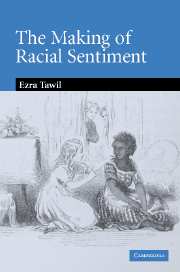Book contents
- Frontmatter
- Contents
- Acknowledgments
- Introduction: Toward a literary history of racial sentiment
- 1 The politics of slavery and the discourse of race, 1787–1840
- 2 Remaking natural rights: race and slavery in James Fenimore Cooper's early writings
- 3 Domestic frontier romance, or, how the sentimental heroine became white
- 4 “Homely legends”: the uses of sentiment in Cooper's The Wept of Wish-Ton-Wish
- 5 Stowe's vanishing Americans: “negro” interiority, captivity, and homecoming in Uncle Tom's Cabin
- Conclusion: Captain Babo's cabin: racial sentiment and the politics of misreading in Benito Cereno
- Notes
- Index
Conclusion: Captain Babo's cabin: racial sentiment and the politics of misreading in Benito Cereno
Published online by Cambridge University Press: 22 September 2009
- Frontmatter
- Contents
- Acknowledgments
- Introduction: Toward a literary history of racial sentiment
- 1 The politics of slavery and the discourse of race, 1787–1840
- 2 Remaking natural rights: race and slavery in James Fenimore Cooper's early writings
- 3 Domestic frontier romance, or, how the sentimental heroine became white
- 4 “Homely legends”: the uses of sentiment in Cooper's The Wept of Wish-Ton-Wish
- 5 Stowe's vanishing Americans: “negro” interiority, captivity, and homecoming in Uncle Tom's Cabin
- Conclusion: Captain Babo's cabin: racial sentiment and the politics of misreading in Benito Cereno
- Notes
- Index
Summary
While giving some directions about setting a lower stu'n'-sail, suddenly Captain Delano heard a voice faithfully repeating his orders. Turning, he saw Babo, now for the time acting, under the pilot, his original part of captain of the slaves. This assistance proved valuable. Tattered sails and warped yards were soon brought into some trim. And no brace or halyard was pulled but to the blithe songs of the inspirited negroes.
Herman Melville, Benito CerenoIn the chapters above, I have been concerned with tracing the formation of a racialist common sense in American culture, and in particular with exploring the role of a particular strand of literary culture in this process. As a result, some readers may find it frustrating how little I have focused on the forms of resistance to, or critique of, this dominant position – a situation perhaps exacerbated by my emphasis on how some of the putatively “progressive” literary works themselves helped to produce a distinct and entrenched form of racialism characterized by the discourse of benevolence and sympathy. If I have thus represented a stifling kind of unanimity on the question of race, it is only because I have been at pains to explain in explicit detail the pervasive power of a dominant ideology. Having said that, there were of course many sites and types of resistance to dominant racial ideology in nineteenth-century America.
- Type
- Chapter
- Information
- The Making of Racial SentimentSlavery and the Birth of The Frontier Romance, pp. 191 - 208Publisher: Cambridge University PressPrint publication year: 2006

